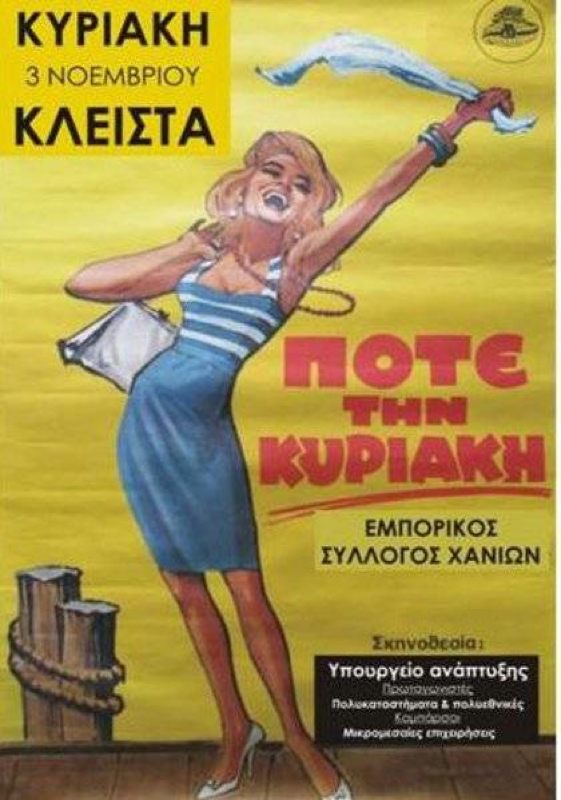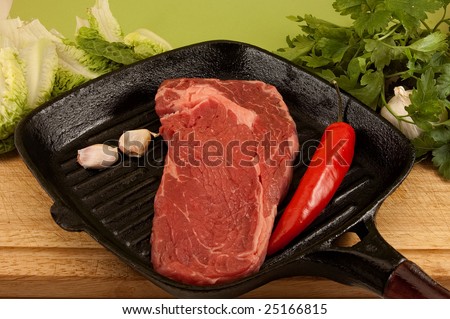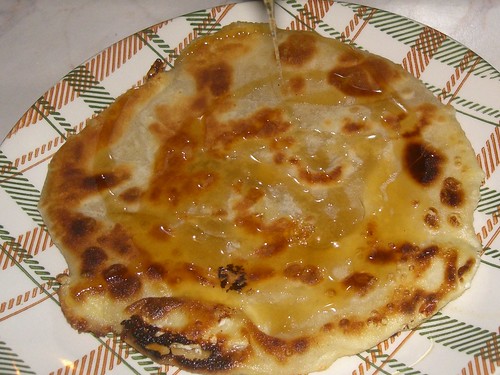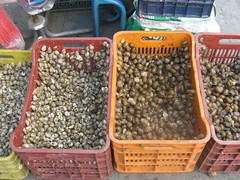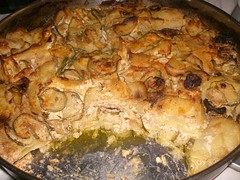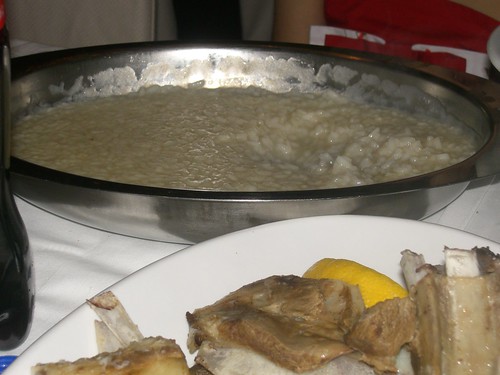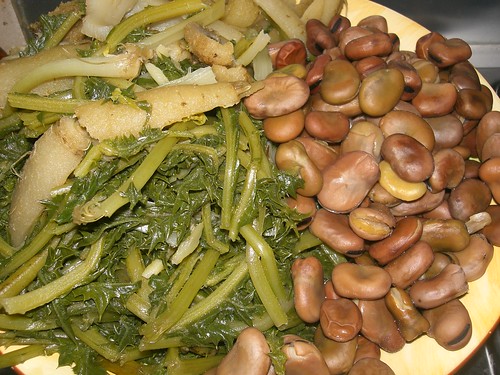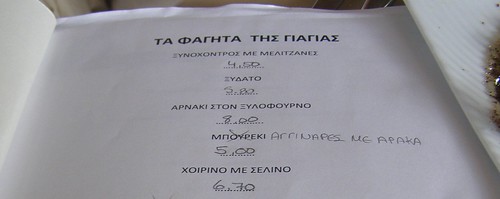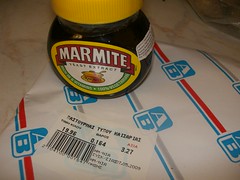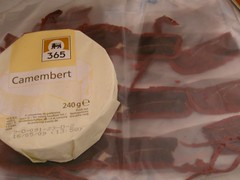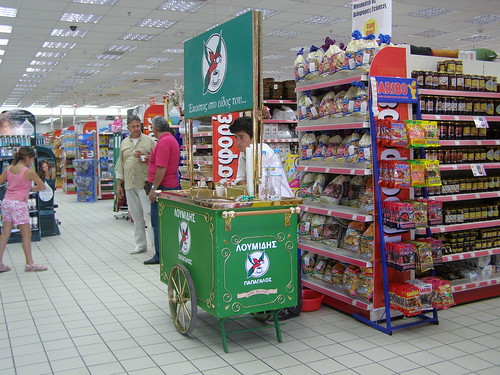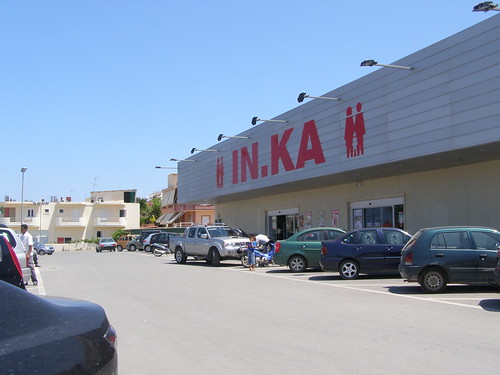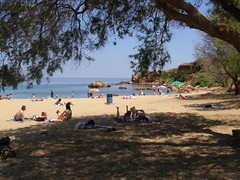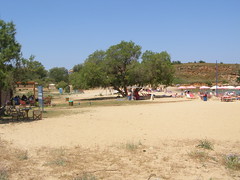While I'm getting ready to visit the Ministry of Food exhibition at the Imperial War Museum in London, here's a taste of the what the Greek version could be like if I were running it. This post definitely needs to be taken in small bites... Dear Mr P,
First things first, belated congratulations on taking office and heading the country. I trust that you will endeavour to steer our country in the right direction. Let me tell you that, as a loyal Greek citizen, you have my full support in your work, and that I will not allow the
Year of the PIIGS to taint my beloved country's name with its stigma. As instructed by your team, I have been demanding and collecting all the receipts for all my purchases and placing them in a specially labelled box (which has, to my dismay, already started to fill up)...

 PM's orders...
PM's orders...... to ensure that I will get the full tax rebate you have so generously allocated to every Greek citizen when I fill out my tax papers next year. When the Brussels sprouts from the European Commission come to check up on us again, to ensure that we aren't doing any (more) creative accounting and
reporting a fiscal deficit only half as high as we now know to be the case, you can tell them to come to my place, and I will let them look into that little box, so that they can see that whoever sold me whatever has been charging the customer ΦΠΑ* and they've paid their dues to the taxman, and our country can once again stand tall and take pride in our achievements, such as winning the
Eurovision song contest and
the Euro Cup, organising
the most successful modern Olympic Games ever to be held without an incident of terrorism marring the event, and the recent opening of
one of the world's greatest museums in the world.
 Waiting for their kidnapped sister to be returned...
Waiting for their kidnapped sister to be returned...
They can then leave us alone and concentrate on more pressing matters, like putting their money where their mouths are, in the more urgent issues of the failures in the economies of Dubai and Iceland, which the United Kingdom has invested in so heavily - may God grant them grace, as He has done
so many times to our own precious land.
Babylonian profiteering - there was never a hint of sustainability in this project.
But I mustn't tire you with such banter, Mr P, because I know that you are a very busy man. In any case, my forte is not economics in the strictest sense; I should not be dabbling in the country's affairs in this sector and just leave this job in the hands of your expert team. Thus, at this point, I will immediately set upon the purpose of my writing to you: as a conscientious citizen, with skills, knowledge and expertise to offer, I would like to give my services to our country - yes,
OUR country, and
we don't need to be born here to claim that, as both of us would know - in the sector of
home economics, via the
Ministry of Food.
I know you have often come to my hometown in Crete on official duties, Mr P, and probably the best of Crete has been laid out for you to indulge in on all your visits. You were probably served
dackos and
hohlioi for
amuse-bouches,
xidato and
boureki as
entrees,
pilafi and
vrasto for mains,
with
ascrolimbi as a salad,
and
kalitsounia drizzled with honey for dessert,
all washed down with a few sensual glasses of
Kotsifali wine.
You would have noticed that we Cretans know how to eat well, without having to resort to molecular gastronomy and hi-tech plating to make our food look more appealing; none of that pretentious mumbo-jumbo for us, no sirree! Did all your senses come into play as you indulged in those Cretan meals you were offered as an honest guest? The kaleidoscopic array of colourful fresh produce, the luxurious aromas of the food as it makes its way to your table, the superlative tastes of the products, the rustic charm of your hosts'
Cretan accent, almost a pre-requisite to proving its authenticity, as if the food could not taste so good if it were served by someone who did not pronounce their
yia as
jia, or their
tis as
tsi, and the hedonistic, if somewhat messy, feel of the kokkalaki.
Good meat is like a woman, Mr G - it needs hands; your
late father must have taught you something about that. You'd be surprised at
how much we have in common on that point!
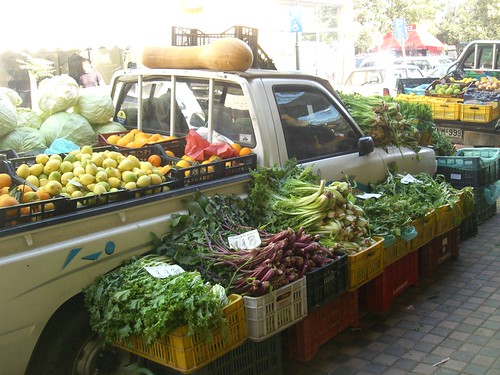 A greengrocer's in the town centre
A greengrocer's in the town centreYou know how good we have it here: high quality food, raised in a mild temperate Mediterranean climate, where the rays of the sun never seem to be lacking, quickly thawing our early morning winter frost in the colder months. Don't get me wrong, Mr P, I'm not trying to acquire more subsidies for Cretan farmers (although
you will recall how scroogy the last ones were, and
how you yourself were treated when you came to support us in our rallies). I am just trying to remind you of the greatest boon to the epicureans among us: our food is practically all
local, George. Can you believe it - in the globalised world we live in, the largest island in the Greek state can produce more than enough food to feed itself as well as other parts of the country without having to resort to foreign imports?
 There are times when we all feel like indulging in something different from our traditional culinary regime...
There are times when we all feel like indulging in something different from our traditional culinary regime...I now touch upon the point that I wanted to make to you, George. Have you checked out the fresh produce section of the supermarket lately? Don't ask me which supermarket I was in; to my knowledge (gained from being my household's shopper-in-chief), they do not differ on this point. I beg your pardon - I apologise for assuming your ignorance on this topic, but as I already mentioned, I know you are a very busy man, and you probably do not have time yourself to do the food shopping in your household, but you might like to get a report on what is happening in these establishments from your staff (unless your wife would like to inform you about the situation herself during her weekly shop). I was in the supermarket the other day (you will find me in one of those establishments at least two or three times a week), looking to buy some crisp apples for my family, when I almost had a heart attack: as I was searching the fresh produce section to select some crispy apples for my brood, my eyes were dazzled by the array of foreign produce that passed before them:
baby corn from Thailand, radiccio and prickly pears from Italy, boiled beetroot from France, papaya from Ecuador, baby potatoes from Cyprus, pomegranates, kumquat and Medjoul dates from Israel, mango from Brazil, coconut from Sri Lanka, Brussels sprouts from Holland, radish from Israel, asparagus spears from Peru, plums and mini pineapple from South Africa, and large pineapple from Costa Rica.
We are constantly bombarded by so much choice that we are literally drowning in it. We cannot choose due to the abundance of choice, despite the fact that most of these products are out-of-season, not local, and possibly a tad
inappropriate in our lifestyle. We have lost our sense of proportion when we feel the need to buy ready-boiled
beetroot from a village supermarket; pray tell me - is it asking for too much from the average home cook to boil them themselves in their country kitchen? Hania is drowning in
pomegranate production, while we are being offered imported ones! Poor Kerkira has been trying for years to make her
kumquats more marketable, yet we are being sold such products by a country that does not even have enough water supplies to keep their plants growing! And what can one say about Holland, who grows a whole host of vegetables that they import all over Europe, even though she herself lacks land surface and grows everything hydroponically; she's even the top European distributor of citrus fruit - and she doesn't even grow any herself!!!
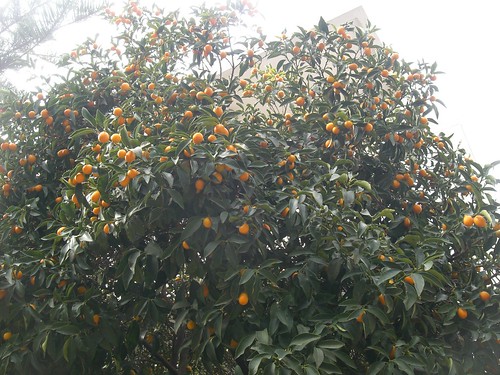 This kumquat tree in urban Hania was laden with fruits, at the same time (early January, 2010) that the supermarket was selling Israeli kumquat for 5.97 euro/kilo. The fruit was at its prime; it was a little bitter, but quite juicy. It isn't peeled - you bite into it as it is. Only the lower fruits on the tree had been picked - the rest will presumably fall onto the ground, unused. Kumquat is grown commercially only on the island of Kerkira.
This kumquat tree in urban Hania was laden with fruits, at the same time (early January, 2010) that the supermarket was selling Israeli kumquat for 5.97 euro/kilo. The fruit was at its prime; it was a little bitter, but quite juicy. It isn't peeled - you bite into it as it is. Only the lower fruits on the tree had been picked - the rest will presumably fall onto the ground, unused. Kumquat is grown commercially only on the island of Kerkira.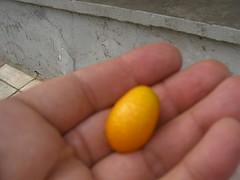
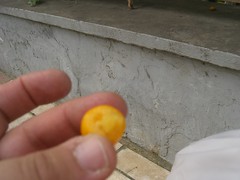
And what's this with the pineapple? Even
size seems to matter when choosing what foreign imported non-seasonal produce we are going to buy; perhaps this is because we have learnt to be more vocal about demanding our freedom to basic human rights (you should be proud of your grandfather's achievements in this respect), one of which is freedom of choice: when other people are fighting for their human right to have access to clean water, medicine and decent accomodation, our compatriots are saying**:
Μικ-PA! Με-ΓA-λα! Τα θέ-λω Ό-λα!
(Big! Small! We-Want-Them-ALL!)
And to think, we don't even cultivate the product ourselves! How on earth did we so quickly turn from
snail-foraging war survivors to instant gratification pleasure seekers? By George, George -we're beginning to sound like the British: "
I can bloody well eat what I like when I bloody well feel like it"! On top of that, we find ourselves in the midst of an economic crisis, and yet, supermarket giants proudly display provocative price tags, such as
Peruvian asparagus spears at 7.94 euro/kilo! Last, but not least, have you ever tried imported fresh produce yourself, George? Perfect to look, tasteless to eat, which I discovered after falling into the temptation myself of gluttony. Did I really need to eat pomegranates after our own pomegranate season had ended?
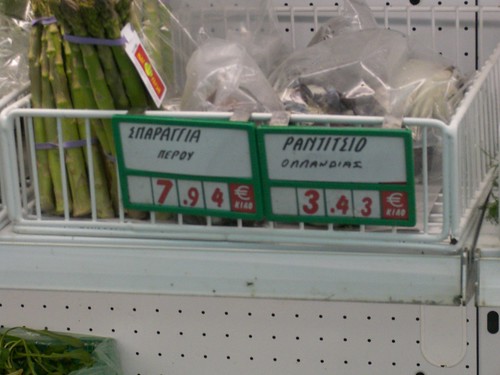 Peruvian asparagus and Dutch radicci0 - the prices are a little scary...
Peruvian asparagus and Dutch radicci0 - the prices are a little scary...And that's not all your (wo)man in Hania has noticed going on food-wise in the birthplace of the world-famous
Mediterranean Diet. Our restaurants have stopped serving "mama's food"; they're now calling it "yiayia's food. And what's the outcome of all this new-fangled culinary fashion, George? For a start, there's the
death of the Mediterranean diet, supplanted by a globalised food culture; obese Cretan children, who get little physical exercise and are raised on low-quality produce; a once food-based society now showing a lack of food knowledge; the loss of traditional culinary skills since cooking is not being passed on from one generation to another like it used to be; food fashions replacing food traditions. The list is too long to write up here, George; we need to form an expert team to address the issue, with special measures to protect us from such outcomes.
That's why you need me, Mr P: I'm a mama with primary school-aged children who are eating
"yiayia's food" still being cooked by their very own mama! There's a clear need for mama's cooking to be introduced back into the home, otherwise can you imagine the implications of that phenomenon? The youth of today (our country's future, don't forget that!) are starting to be raised on the assumption that grandmothers cook, while mothers don't because they go out to work and don't have time to do this anymore. Before you criticise me for my anti-feminist sentiments, hear me out: mama's kouzina could easily be re-named
papa's kouzina - equal rights for all!
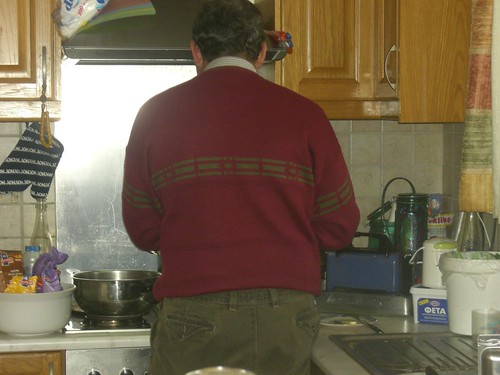 Mr OC in the kitchen
Mr OC in the kitchen
In conclusion, before I exceed my talk time, I would like to present my manifesto, to prove to you how deeply I have considered these issues, with some practical solutions to overcome their negative outcomes:
- PRODUCE BAN: There must be a ban on importing foreign produce that is growing seasonally in the homeland; we cannot be importing products grown in excess while ours are allowed to go to waste unsold, eventually being used for animal feed. In any case, imports must not exceed exports.
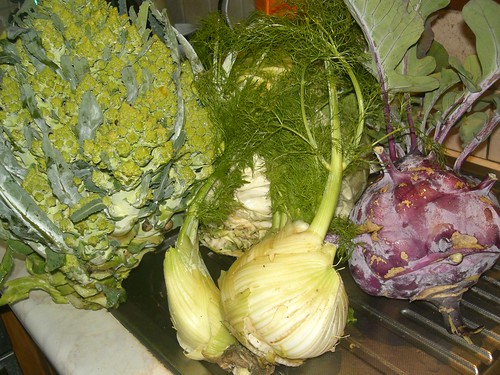
None of these products are available as local produce in Hania stores; they are always imported. Yet they can all grow in Hania - these ones are from my uncles' farm, a mile away from my home.
- CULTIVATION: Greek farmers should be planting not only well-known Mediterranean species, but also hardy tropical species previously unknown to Greek soil; Mr Organically Cooked has managed to produce mango in our village - maybe you can also make use of him in some way in the Ministry (Greek politics have always been very much a family affair, haven't they, George?).

Our very own mango tree, growing in our orange orchard
- PROMOTION: Greek produce must be given priority over foreign products. This can be achieved by displaying them prominently, advertising via the "home is best" slogan, and other ethnocentric ploys that many other nations in the world to promote their own products over other countries'.
-
 A car sticker I spotted while visiting the Duxford Air Museum, Cambridge, UK in 2006.
A car sticker I spotted while visiting the Duxford Air Museum, Cambridge, UK in 2006. - EDUCATION: We need to get people to take more interest in the food they eat, by teaching them to eat seasonally (ie sensibly), and showing them how to create gardens in limited spaces like rooftops and balconies, dissuading people from creating lawns and flower gardens in more arid places receiving less rain (eg Crete). It doesn't just have to be organic to taste good!
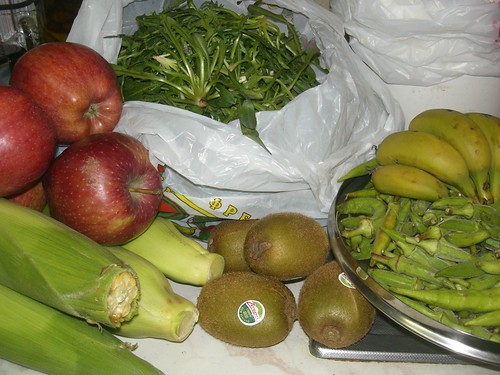
Everything in this photo is local food (except for the kiwifruit), but none is organic.
- RATIONING: We must introduce a system of rationing imported goods. Everyone needs to carry a rations booklet, stating their imported food purchases: once they exceed their monthly limit, they will only be allowed to buy local produce. Fair trade is all part of the process by which we measure a country's progress, but enough is enough, don't you think?
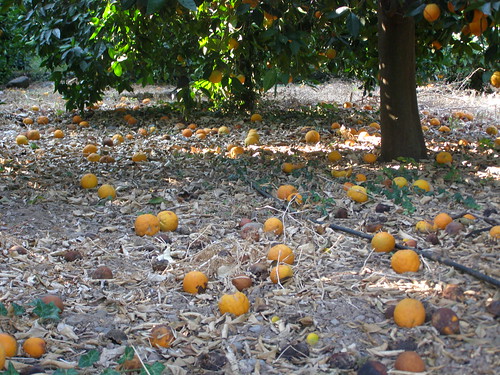 Cheaper imports means that, often, Greek produce lies wastefully in the same place it was grown while people buy and consume foreign produce...
Cheaper imports means that, often, Greek produce lies wastefully in the same place it was grown while people buy and consume foreign produce...
I trust, Yiorgaki, that you will take my considerations into serious account and get back to me once you have thought about how you intend to handle the situation. Until then, I leave my country in your strong hands. And if ever the Minister of Rural Development and Food,
Mrs Katerina, or her deputy, Mr
Mihali, decide that they cannot keep up with the demands of the job and aren't able to live up to the expectations of the tasks that they have been entrusted with, you know who to turn to, don't you?
Sincerely yours,
A loyal Greek citizen from the
MegalonissosPS: In case you were wondering which apple variety I purchased, I must admit I succumbed to temptation -
Pink Lady, an imported variety from Italy. You will understand why I preferred them over the others - they were all
bad apples!

A Pink Lady apple (imported from Italy), standing next to another Australian invention (grown in Greece), the Granny Smith. Pink Lady is always unblemished and crisp - these are the kinds of apples I'd like to eat...PPS: Forgive me once again for dabbling in matters that I am no expert in, but I hope you don't mind me mentioning that when you make major changes to our daily cost of living, could you at least try to make them during the day, and not during
late-night parliamentary sessions when most people are sleeping and can't react to them? We're not all
efoplistes, you know!
*ΦΠΑ = VAT = value-added tax
** Chant this in the tune of the well-known Greek slogan: Ψω-μί, παι-δεί-α, ε-λευ-θε-ρί-α!©All Rights Reserved/Organically cooked. No part of this blog may be reproduced and/or copied by any means without prior consent from Maria Verivaki.






